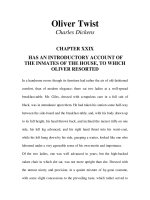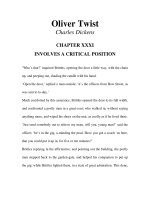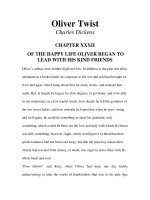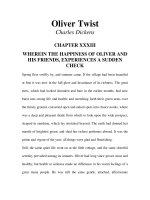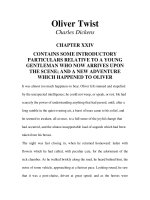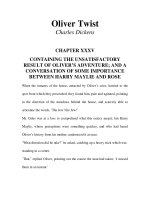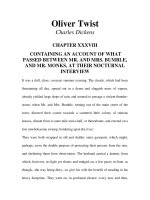Tài liệu LUYỆN ĐỌC TIẾNG ANH QUA TÁC PHẨM VĂN HỌC-THE ADVENTURES OF SHERLOCK HOMES -ARTHUR CONAN DOYLE 5-1 docx
Bạn đang xem bản rút gọn của tài liệu. Xem và tải ngay bản đầy đủ của tài liệu tại đây (33.55 KB, 13 trang )
THE ADVENTURES OF SHERLOCK HOMES
ARTHUR CONAN DOYLE
The Five Orange Pips
When I glance over my notes and records of the Sherlock Holmes cases
between the years '82 and '90, I am faced by so many which present strange
and interesting features that it is no easy matter to know which to choose and
which to leave. Some, however, have already gained publicity through the
papers, and others have not offered a field for those peculiar qualities which
my friend possessed in so high a degree, and which it is the object of these
papers to illustrate. Some, too, have baffled his analytical skill, and would
be, as narratives, beginnings without an ending, while others have been but
partially cleared up, and have their explanations founded rather upon
conjecture and surmise than on that absolute logical proof which was so dear
to him. There is, however, one of these last which was so remarkable in its
details and so startling in its results that I am tempted to give some account
of it in spite of the fact that there are points in connection with it which
never have been, and probably never will be, entirely cleared up.
The year '87 furnished us with a long series of cases of greater or less
interest, of which I retain the records. Among my headings under this one
twelve months I find an account of the adventure of the Paradol Chamber, of
the Amateur Mendicant Society, who held a luxurious club in the lower
vault of a furniture warehouse, of the facts connected with the loss of the
British bark Sophy Anderson, of the singular adventures of the Grice
Patersons in the island of Uffa, and finally of the Camberwell poisoning
case. In the latter, as may be remembered, Sherlock Holmes was able, by
winding up the dead man's watch, to prove that it had been wound up two
hours before, and that therefore the deceased had gone to bed within that
time--a deduction which was of the greatest importance in clearing up the
case. All these I may sketch out at some future date, but none of them
present such singular features as the strange train of circumstances which I
have now taken up my pen to describe.
It was in the latter days of September, and the equinoctial gales had set in
with exceptional violence. All day the wind had screamed and the rain had
beaten against the windows, so that even here in the heart of great, hand-
made London we were forced to raise our minds for the instant from the
routine of life and to recognize the presence of those great elemental forces
which shriek at mankind through the bars of his civilization, like untamed
beasts in a cage. As evening drew in, the storm grew higher and louder, and
the wind cried and sobbed like a child in the chimney. Sherlock Holmes sat
moodily at one side of the fireplace cross-indexing his records of crime,
while I at the other was deep in one of Clark Russell's fine sea-stories until
the howl of the gale from without seemed to blend with the text, and the
splash of the rain to lengthen out into the long swash of the sea waves. My
wife was on a visit to her mother's, and for a few days I was a dweller once
more in my old quarters at Baker Street.
"Why," said I, glancing up at my companion, "that was surely the bell. Who
could come to-night? Some friend of yours, perhaps?"
"Except yourself I have none," he answered. "I do not encourage visitors."
"A client, then?"
"If so, it is a serious case. Nothing less would bring a man out on such a day
and at such an hour. But I take it that it is more likely to be some crony of
the landlady's."
Sherlock Holmes was wrong in his conjecture, however, for there came a
step in the passage and a tapping at the door. He stretched out his long arm
to turn the lamp away from himself and towards the vacant chair upon which
a newcomer must sit.
"Come in!" said he.
The man who entered was young, some two-and-twenty at the outside, well-
groomed and trimly clad, with something of refinement and delicacy in his
bearing. The streaming umbrella which he held in his hand, and his long
shining waterproof told of the fierce weather through which he had come.
He looked about him anxiously in the glare of the lamp, and I could see that
his face was pale and his eyes heavy, like those of a man who is weighed
down with some great anxiety.
"I owe you an apology," he said, raising his golden pince-nez to his eyes. "I
trust that I am not intruding. I fear that I have brought some traces of the
storm and rain into your snug chamber."
"Give me your coat and umbrella," said Holmes. "They may rest here on the
hook and will be dry presently. You have come up from the south-west, I
see."
"Yes, from Horsham."
"That clay and chalk mixture which I see upon your toe caps is quite
distinctive."
"I have come for advice."
"That is easily got."
"And help."
"That is not always so easy."
"I have heard of you, Mr. Holmes. I heard from Major Prendergast how you
saved him in the Tankerville Club scandal."
"Ah, of course. He was wrongfully accused of cheating at cards."
"He said that you could solve anything."
"He said too much."
"That you are never beaten."
"I have been beaten four times--three times by men, and once by a woman."
"But what is that compared with the number of your successes?"
"It is true that I have been generally successful."
"Then you may be so with me."
"I beg that you will draw your chair up to the fire and favor me with some
details as to your case."
"It is no ordinary one."
"None of those which come to me are. I am the last court of appeal."
"And yet I question, sir, whether, in all your experience, you have ever
listened to a more mysterious and inexplicable chain of events than those
which have happened in my own family."
"You fill me with interest," said Holmes. "Pray give us the essential facts
from the commencement, and I can afterwards question you as to those
details which seem to me to be most important."
The young man pulled his chair up and pushed his wet feet out towards the
blaze.

